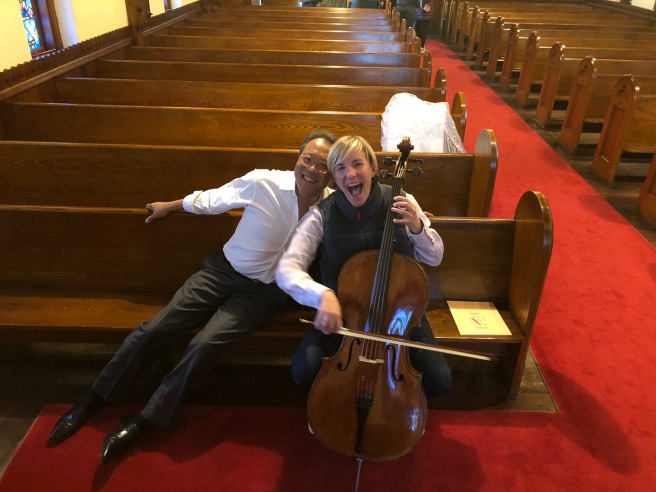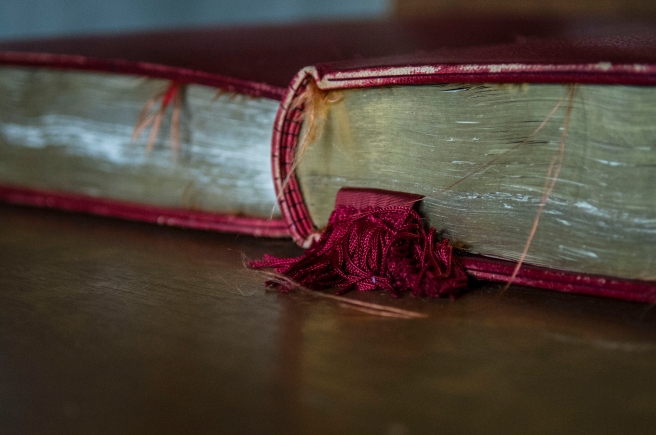A sermon preached at St. John’s Episcopal Church, Cold Spring Harbor, NY on Sunday, November 18, 2018.
Last month, my wife and I were involved in the music for a wedding at which Yo-Yo Ma played the cello. When we arrived the day before, to rehearse with Yo-Yo, he said to my wife, “Oh, you must play the Davidoff!” He was referring to the cello – a Davidov Stradivarius built in 1712 – he has played since 1987 when, upon the death of Jacqueline Du Pré, it was made available for his exclusive use. You can imagine the feelings that arose in Kate’s soul, as she proceeded to play this extraordinary instrument. The history behind this cello, the music it had played, the hands of those who had touched it, and the ears of those who had heard it, over the last three hundred years, was almost inconceivable. The emotional response that this opportunity brought out in Kate was extremely powerful, and transcended any number of similar musical experiences. There was history behind this moment. Kate is now part of the history of this instrument. While Yo-Yo Ma is notoriously one of the nicest people in the music business, this simple, thoughtful gesture of his, knowing how much this opportunity would mean to us, was presented without ceremony, without sensationalism, and with immense generosity of spirit. Yo-Yo knew that he had a duty, if you will, an obligation, to share the power and beauty of a hugely important work of art.

As I wrote these notes, last Friday evening, I was a few hours away from a long-standing tradition that takes place at St. Paul’s School at the end of each term. It is known as Last Night Service, where the entire school gathers in chapel to mark the end of each term. While it is a short, simple occasion, it is packed with significance that can be felt by the community as a whole. The service gives a sense of completion to the term. The same hymn, known as the Last Night Hymn, is sung at the start of every Last Night Service, complete with its Victorian language:
“Saviour, source of every blessing
Tune my heart to grateful lays
Streams of mercy, never ceasing,
Call for ceaseless songs of praise.
Teach me some melodious measure,
Sung by raptured saints above;
Fill my soul with sacred pleasure.
While I sing redeeming love.”

And after a few prescribed prayers – the same every time – the final collect is sung by the choir. This is sung to a musical setting by a former organist of the school, Robert Powell, and the text is this:
“O Lord, support us all the day long, until the shadows lengthen and the evening comes, and the busy world is hushed, and the fever of life is over, and our work is done. Then in thy mercy grant us a safe lodging, and a holy rest, and peace at the last. Through Jesus Christ our Lord. Amen.”
Of course, I lament the editing of Cardinal Newman’s original line, “O Lord, support us all the day long of this troublous life,” that I would sing as a boy chorister. However, this is principally a feeling based upon emotion and a certain degree of fond reminiscence rather than any aesthetic or academic reasoning. In any case, you can probably begin to see where I am heading with this thought. A vast amount of my deep appreciation for language, my internalizing of music, my obsession with order, comes from an emotional response to fifty years of exposure to, and involvement in, music and liturgy. As a creative musician, and especially as a composer, I am busily involved in, and passionate about, the power that music holds to touch, stir, move and, sometimes, burn in the soul of the listener. I feel the same way about poetry, and also about buildings. The smell of a building. The way it is organized. The manner in which we light the space. The respect we afford the rooms we enter. I am driven to share that appreciation with others, to communicate through the channels of this tradition – although mere words often fall short of the mark in this regard – and yes, to be a steward, of its bounty.
Stewardship: The careful and responsible management of something entrusted to one’s care.
When I think about us being careful and responsible managers of The Anglican Tradition, whether its music, its Book of Common Prayer, its Hymnal, its liturgy, I find it challenging not to slip into a stance of “defender” as opposed to a mere “steward.” With prayer book and hymnal revision being highly-touted priorities these days, often in combination with needs and motivations that are driven by important social-justice based initiatives, it is jarring for defenders of tradition to be balancing the issues at hand. Whilst the need for reform is beyond debate, the way in which we achieve these goals – which are many and various – is a matter to be handled with great care. How easy it is to be drawn into the pressures of our cultural norms. And how crucial it is that our churches should provide an alternative to everyday culture as opposed to a reflection of it. Our liturgies, our music, our poetry, and our artifacts are all there to feed us for the work we must all do in the world. As churches, cathedrals, and chapels, we need to be leaders and shapers of culture, as opposed to mere followers of what twenty-first century society lays on the world which, let’s face it, can be remarkably whimsical and short-lived.

As we consider our next moves as a Christian denomination, it is crucial that any revisions to our “common” prayer, and “common” song, are exercised with as much scrutiny of the past as the future. Where we have been before will guide us to the future. Options can be useful, but just as a word-change in a centuries-old hymn can lessen the negative impact of a questionable turn of phrase, it can just as easily destroy a deeply-held connection to a beloved text. It can also, for obvious reasons, weaken the “communal” or “common” approach to singing and praying. We live in a time when revision and reinvention can be achieved at the flick of a switch, and not always for carefully considered reasons. With more intellectualizing of all things possible nowadays, with worldwide communications as they are, we are in serious jeopardy of losing the emotional and sentimental content of our lives. Those of us who live and work in establishments that care for many generations of students, benefactors, or congregation members, are quite connected to the fact that a deep attachment to an anthem written in the nineteenth century will live on in their lives through an emotional tie to its tune, memories of its performance over the years, or mental images of loved ones singing it. We can so easily forget the importance of gut feelings, in favor of the more intellectualized response that modern society demands of us.
As stewards of tradition, we have a challenging, sometimes frustrating but, ultimately, richly-rewarding path ahead of us. The opportunity to share a deep love of something with others is one of life’s greatest gifts. Selling something to society that does not always have instant appeal, the bells and whistles of our tech-savvy population, or the logic that has been drilled into us regarding what is true in life. To sum up, I’d like to share a couple of quotes from opposite ends of the globe – the first from Australia, and the second from Great Britain – both of which reflect the universal language, and immeasurable value, of the tradition that has come down to us.
“When I sit in the cathedral, I see history, music and architecture paraded before me. One of the great duties of faith is to be the carrier of culture. Religions are the repository of our wonderful liturgical music and the majestic language of the King James Bible. The soaring architecture evokes images of both the Medieval roots of our European history and the Victorian English who, whether we like it or not, shaped much of the Australian persona. The art and painting, while less than genius, are the greatest of religious art (unfortunately to be found in other places). And the music is, for aficionados, deeply moving. It is the total package.” — Blogger, Melbourne, Australia
“The music is beautiful, but the special quality of Evensong lies in other places too, in the paradoxical contrast between the sinewy intricacy of 16th century language, and the simplicity of the thoughts it expresses: prayers for courage, for grace, for protection from the dark, for a good death. These are things to which our minds have particularly lately turned in the aftermath of recent terrible events, but they were there all the time in the psalms and collects of Evensong. For almost 500 years the same words have been repeated by people in times of trouble or of triumph. The presence of that cloud of unseen witnesses lends an intangible quality to Choral Evensong. You could call it calm or spirituality. You could call it holiness. But it’s very precious.” — Stephen Shipley, music producer



